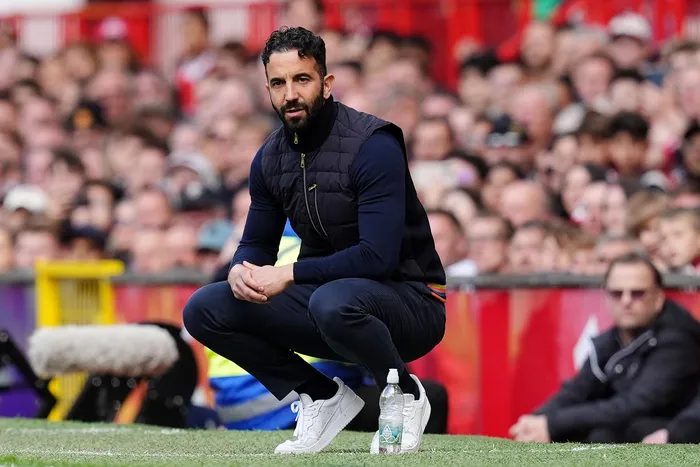
Manchester United's Ruben Amorim's tactical philosophy has been given the backing of the board in the recent transfer window.
Image: EPA
Manchester United are looking leaner and meaner after being stripped to the bone and rebuilt in the recent transfer window.
It seems the fallen giants have finally broken the shackles that have weighed Old Trafford down for years – a legacy of bloated squads, misfiring stars, dressing-room disharmony and a muddled recruitment plan often at odds with the managers’ philosophies.
Rúben Amorim, now in his second season at the helm, can no longer lean on those crutches. The firesale of unwanted assets and a raft of carefully structured loan exits has finally cleared the path for him to implement his style of play – something he spoke about at length last season as United bumbled their way to a nightmare 15th-place finish.
Failure to secure European football, along with United’s tricky financial situation, seemed to jeopardise their chances of moving up the table. The bigger issue, though, was how to shift the pile of deadwood clogging the system – high-profile stars not fit for Amorim’s purpose, or that of his predecessors.
The project took on extra urgency with the arrivals of Benjamin Šeško, Matheus Cunha and Bryan Mbeumo early in the transfer window. None are glamour signings in the traditional United sense, but they are functional additions who fit Amorim’s playbook of pace, pressing and flexibility.
They are typical Amorim signings, echoing his Sporting CP days, where few of his title-winning squad were household names.
Early signs this season are promising. Despite picking up only one point in the first two games, United were unlucky to lose to Arsenal, while the comeback win against Burnley before the international break was – dare one say – almost Fergie-like.
The trimming of fat was executed with near-surgical precision, keeping the vital organs untouched.
Marcus Rashford joined Barcelona on loan. Rasmus Højlund, once heralded as the future No 9, was shipped to Napoli on loan with an option to buy. Antony, a symbol of Erik ten Hag’s transfer indulgence, was sold to Real Betis. Alejandro Garnacho went to Chelsea, Jadon Sancho joined Aston Villa on loan, and even goalkeeper André Onana departed for Trabzonspor after Senne Lammens arrived from Belgium.
These weren’t just sales and loans – they were statements of intent. Amorim and the hierarchy have shown a willingness to cut their losses in the pursuit of clarity. For a club that has too often clung to mistakes – allowing bad transfers to linger like the smell of sweaty socks in the dressing-room – this decisive break is refreshing.
Amorim has overseen a cleansing of sorts. The squad is leaner, more purposeful and built with a clearer footballing identity. Now he must engrave his style into the DNA of the squad, just as Pep Guardiola, Jürgen Klopp and Mikel Arteta have done at their clubs.
At Sporting, Amorim’s sides were defined by positional discipline and relentless pressing. United fans have only seen that philosophy in flashes. That has to change. Supporters will forgive a lot – even long losing spells – if they can see a clear identity developing.
The board has backed Amorim’s tactical vision, giving him the luxury of time to make tweaks and weather the teething pains of such an upheaval. It also gives the Portuguese manager the power to banish the culture of excuses that has clouded Old Trafford since Sir Alex Ferguson’s retirement.
The argument that United cannot play his modern style of football because of “legacy contracts” or “uncoachable egos” no longer holds. Amorim has chosen those he believes can carry his philosophy forward, starting this weekend against bitter crosstown rivals Manchester City, while the deadwood has been discarded.
This is now his dressing-room, for better or worse. The time for excuses is over.
Related Topics: